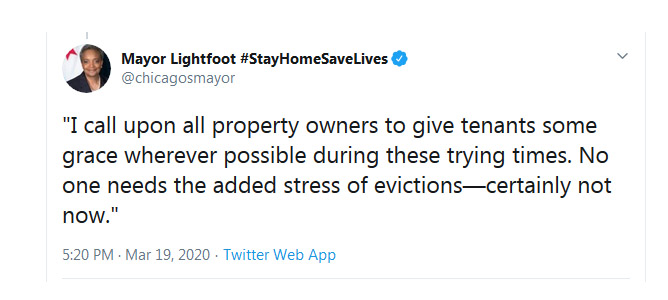 How Can Chicago Landlords Show Grace?
How Can Chicago Landlords Show Grace?
On March 19, 2020, in the early days of the coronavirus pandemic, Chicago’s Mayor, Lori Lightfoot, now famously called upon landlords to “give tenants some grace”. While many landlord’s went along with that sentiment and showed some grace, Chicago City Council Members Matt Martin, Daniel La Spata, Sophia King, Susan Garza Sadlowski, George Cardenas, David Moore, Derrick Curtis, Jeanette Taylor, Howard Brookins, Jr., Michael Rodriguez, Byron Sigcho-Lopez, Roberto Maldonado, Felix Cardona, Jr., Rossana Rodriguez Sanchez, Carlos Ramirez-Rosa, Gilbert Villegas, Andre Vasquez, Jr., and Maria Hadden didn’t think you landlords had it in you to do so voluntarily and so they decided it would be better to impose forced grace upon you in the form of Alderman Matt Martin’s rent deferral ordinance.
The proposed ordinance is unlikely to pass
Mayor Lightfoot publicly expressed her doubts about the ordinance and did not put her political clout behind the effort to pass the measure. Instead, thankfully, that ordinance has been sent along to the “Rules Committee” which is sometimes referred to as “the place proposed ordinances go to die”. But, the progressive, activist (socialist?) sentiment to give to tenants and take from landlords is real and it is out there. So, how can Chicago landlords repay the favor to Mayor Lightfoot and make sure she doesn’t come back to the table with something worse (like rent control) because landlords could not be trusted to do the right thing on their own? That’s actually the subject of tonight’s meeting of the Rogers Park Builder’s Group.
What can landlords do to help?
Luckily, I’ve been working with landlords for some time during this pandemic to find ways to actively show some grace and I’m going to share some of those ways here. The key thing to remember is that every situation is different. Some landlords, on the brink of foreclosure, don’t have much “room” to give. Other landlords, with the benefit of loan restructuring, bailout loans, or the CARES Act, might have some additional room to “share the wealth”. Other landlords might just have an ability to show grace and shoulder some of the burden in a tough time. On the other hand, some tenants need grace more than others and some need more grace than others. Landlord and tenant openness and honesty is integral to this process.  This is an odd time, but it is a time that makes clear that landlording is more than a business – especially for smaller landlords. The operators with fewer units are not just giant conglomerates sitting on piles of cash. They’re people, just like their tenants. They have struggles, just like their tenants. In a time of crisis like now, there is room in the landlord tenant relationship for humanity. That humanity can only come from a “human touch” to the problem. Landlords and tenants need to communicate to find out if they can find a simple adjustment that can ease everyone’s burden. Here are a few of those techniques.
This is an odd time, but it is a time that makes clear that landlording is more than a business – especially for smaller landlords. The operators with fewer units are not just giant conglomerates sitting on piles of cash. They’re people, just like their tenants. They have struggles, just like their tenants. In a time of crisis like now, there is room in the landlord tenant relationship for humanity. That humanity can only come from a “human touch” to the problem. Landlords and tenants need to communicate to find out if they can find a simple adjustment that can ease everyone’s burden. Here are a few of those techniques.
Ways to give some grace
1. Extend grace periods. Rent is due on the first of the month and there is usually a five day grace period. Some tenants would benefit from a simple temporary adjustment in the grace period to pay. If a tenant can’t pay on the 5th but can pay on the 10th, there’s little harm to making a temporary adjustment so that the tenant can stay on track.
2. Waive late fees. For most Chicago landlords, late fees are governed by 5-12-140 of the CRLTO and they are limited $10.00 per month for the first $500.00 in monthly rent plus 5% per month for any amount in excess of $500.00. That’s a $35 late fee on a monthly rent of $1000. During the pandemic, landlords can agree not to impose that late fee.
3. Renew or extend a lease. May is one of the hottest times for new leases in Chicago. Landlords can help spare tenants from the difficulty of going outside and being exposed to infection to look for a new rental unit or to move their belongings if landlords can agree to renew a lease or provide a short-term extension. A year renewal could probably be beneficial as it spares the landlord from the difficulty of finding a new tenant during, you know, a global pandemic!
4. Impose a rent freeze. Landlords, of course, should be keeping their rents at market levels. That said, a renewal at the same rent rate as last year shows some grace. In fact, a landlord looking to show grace could agree to a sliding scale for rent. A landlord could charge $1000 for the first six months of a renewal and then the rent increase could kick in to $1050 for the final six months of the lease.
5. Forbearance. I’ve already blogged about the concept of forbearance in these pages. Forbearance can be a great tool for residential and commercial landlords alike to give some short term relief. Alderman Martin’s ordinance was a form of forced forbearance that was, in many ways, unreasonable. There are, however, ways to do it smart and to do it right.
6. Rent Forgiveness. Some landlords can agree to forgive some rent. Some landlords might do this by reducing the monthly rent to 75% of the full rent amount for a short period of time. Others may forgive it altogether. Remember, this is a temporary situation. A small rent cut might be the difference between the tenant paying most of the rent and paying nothing. It can also go a long way towards building trust and rapport with the tenant. Inasmuch as the court system is closed and landlord’s won’t be likely to evict a tenant until fall anyway, this might be a great way to show a little grace.
7. Return Security Deposits. This is my favorite one. A true win-win for landlord and tenant. The CRLTO makes holding a security deposit deadly to landlords. Hey, wouldn’t this be a GREAT time to give that stupid deposit back? Done properly, with a written release of any security deposit and interest claims the tenant may have against the landlord (say, for failure to hold the deposit in a proper segregated account, failure to disclose the bank name and address, or failure to pay interest), the return of a deposit can get a landlord a release of potentially costly claims and can infuse some much needed cash into the tenant’s hands.
Do it right
So there are a number of ways to give tenants some grace. I’m guessing that most tenants who receive some grace will give back to the landlord in the form of taking just a bit better care of their place and making just a bit more effort to stay current on a lease. Whatever a landlord might do, it should be CLEARLY DOCUMENTED. To prevent misunderstandings down the line, landlords should prepare (or have an attorney help to prepare) a “Grace Amendment” to a lease agreement that fully documents the changes and concessions made to the lease and how long they will be in effect. Making oral agreements or taking steps before a change is properly documented is only likely to lead to problems in the future. Our firm has been helping landlords throughout this crisis give some grace and we would be happy to discuss helping others.
